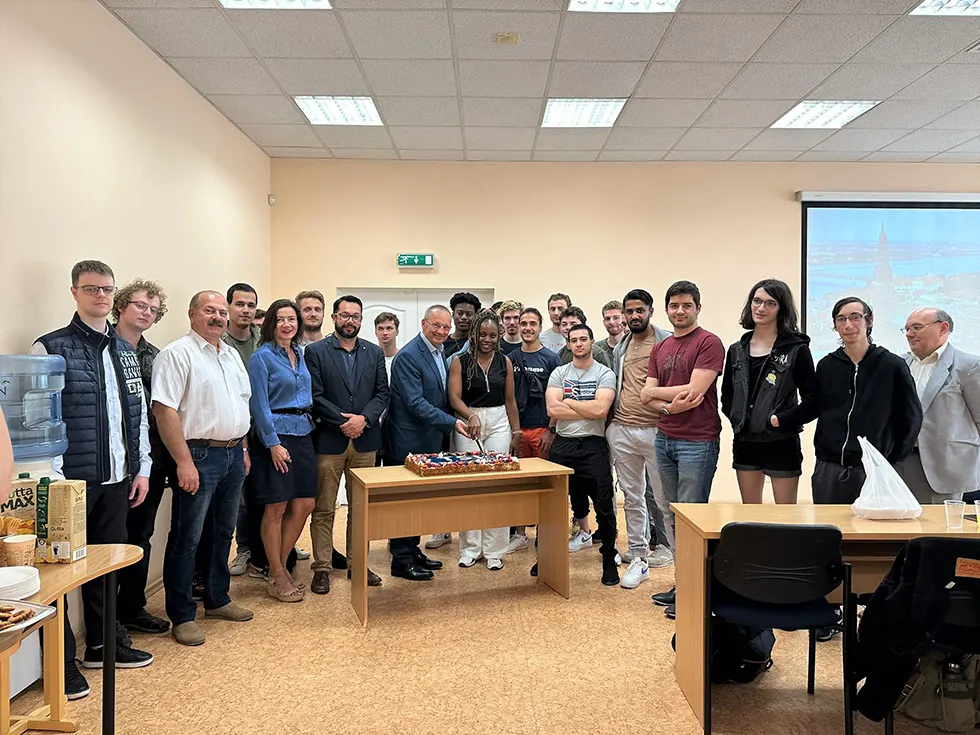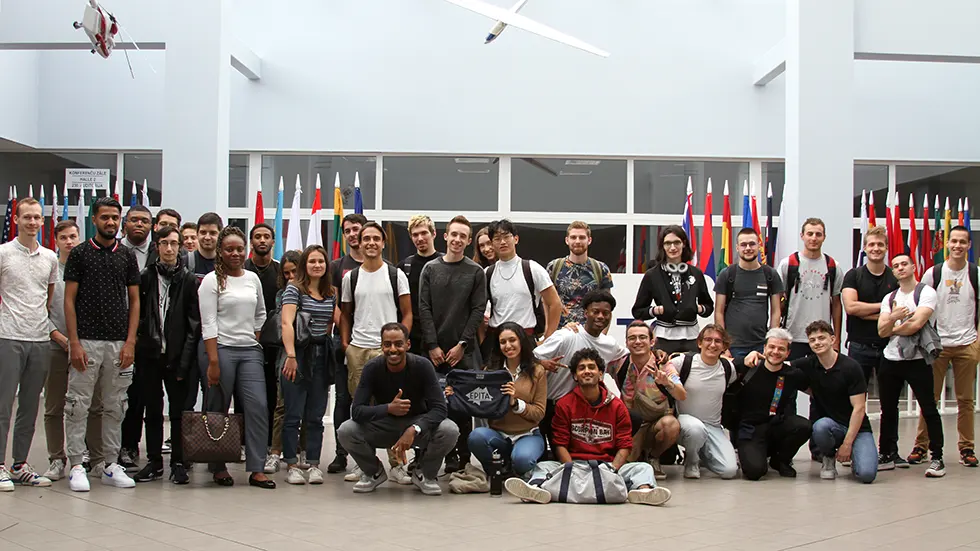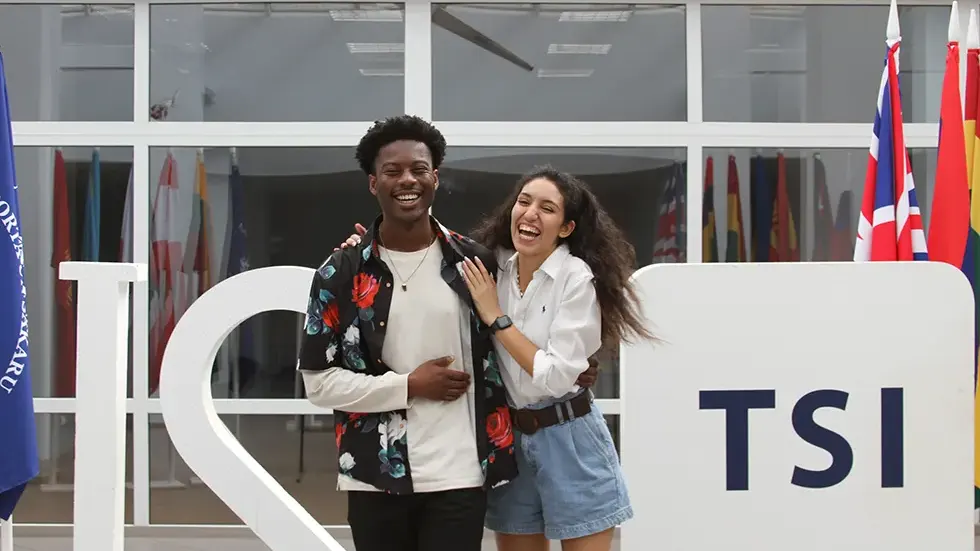TSI annually hosts the Summer School exchange programmes, within which, international students have an opportunity to broaden their horizons. Dive into the multicultural experience with two participants of this year’s TSI Summer School groups: EPITA (France) Cybersecurity programme students, and Software Engineer Apprentices at Google – Sara & Robert. Commented by Acting Dean of the TSI Engineering Faculty – Professor, Ph.D. Emmanuel Merchan.
Coming to a new country is a thrilling experience. Describing their expectations, young people admit they have had different views on that. “I was definitely scared at first as it was the first time that I come to a country I do not know anything about culture-wise!” shares Sara Bouamama (21 y.o.).
20 y.o. Robert Nantchouang Nantchouang says that he, on the contrary, had more to fantasize about: “Coming here I had plenty of big and positive expectations because I actually have a friend who was here last year for the same reason I am here today. He told me only good things about Latvia and TSI.”
Both Sara and Robert have their opinions based on multicultural experience levels: Sara, originally came from Morocco and Robert is natively from Cameroon.
“From TSI’s perspective, running these annual Summer Schools allows us to showcase our expertise in IoT (Internet of things) and cyber-physical systems to talented students from around the world. It’s a chance to form relationships that may lead to future research collaborations as well.” – comments Acting Dean of the TSI Engineering Faculty – Professor, Ph.D. Emmanuel Merchan.
Describing their studying experience Robert and Sara highlight their appreciation of the professional approach of educators, as well as are fascinated by the contents of the courses.
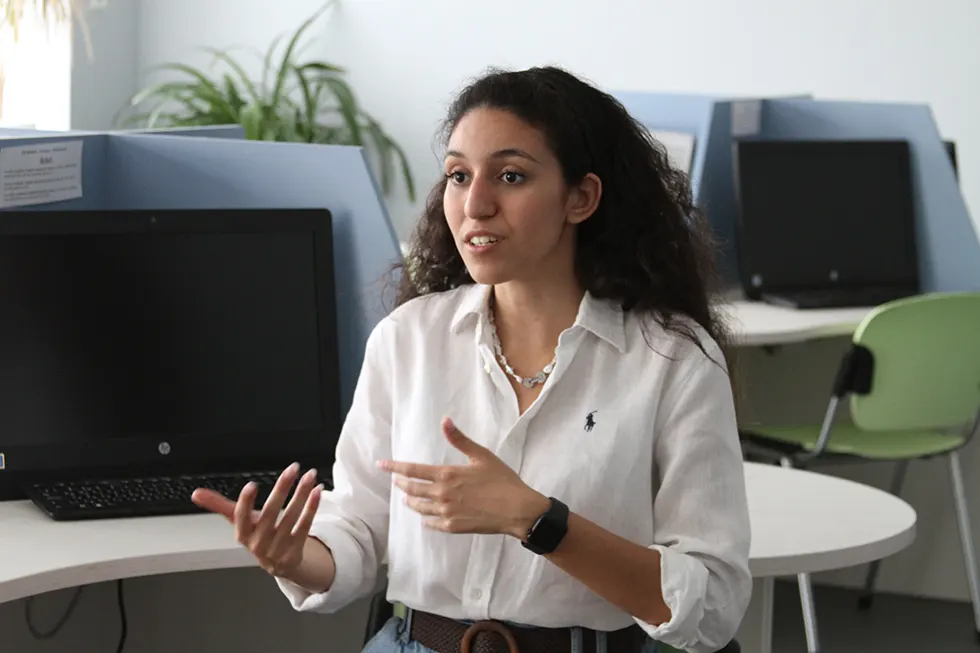
Sara says that “The professors had a really good and deep practical approach to the courses” and finds something to fulfill her professional experience – “The practical side of Cybersecurity is usually coding, so there is no option to “touch” your work or its elements in the literal sense, which was optional during the study experience here. At TSI it was so interesting to actually do manual work, with the wires and everything, while also to code as well of course!”
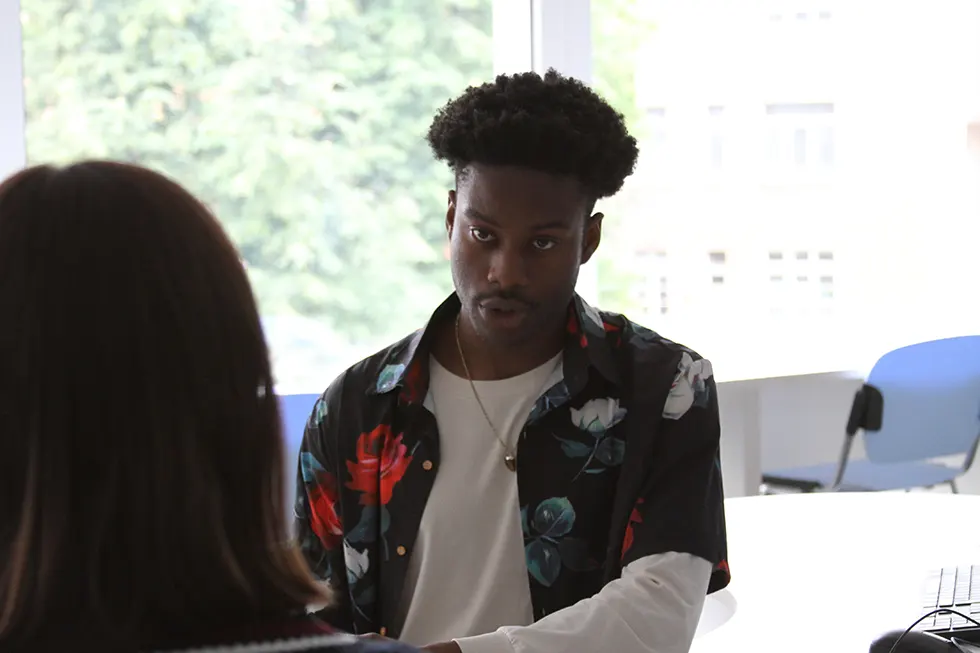
Describing his opinion, Robert admits: “I actually, genuinely loved to be involved in the courses I went through. I marked some things “done” from my personal professional “bucket list”, that I was procrastinating to complete for some time.” Robert had international studying experience in another country last year, and comparing it to the TSI experience, he comments that “despite we got a great experience there too, they are offering courses less related to our field of study”.
Professor Ph.D. E. Merchan describes Summer Schools exchange programme as enriching for our academic staff too. “Interacting with students from different backgrounds pushes us to think about our specialties in new ways and re-examine assumptions. Preparing intensive short courses also keeps our teaching skills sharp,” says he.
Both students were influenced the most by the course “Introduction to the Cyber-Physical Systems”. “We learned the fundamentals that are applicable to our work. I feel that it was a course that gave us universal and fulfilling knowledge. It was also great to get a hands-on experience,” says Robert.
Sara mentions, that during the course, they “had a time resource to do assignments with deeper involvement” and comments, “The courses were really designed aimed at a practical experience. The professors were always there to assist us, I appreciated that every educator was really present for the classes and was always involved – asking questions and making sure we understood everything. I liked how close they were for us to understand the course.”
Sara and Robert both felt that they would have deeper experience if there were Latvian language and history-related lectures or workshops. “If I am being realistic, I feel that one- two days intensive course on Latvian culture and language would be a great addition to the programme. Learning the language of a new country, in my opinion, is always useful, ‘cause it’s how you get connected to more and more people. Through the language, you can also learn the culture. It could be a great contribution for people all over the world to expand their knowledge on the matter of Latvian culture, to know what it is about. Overviewing local culture just over the period of the last few weeks makes me admit that I would be able to understand and find out more if I spoke native language, to get to know the people of Latvia better. That would have been a very nice experience,” Robert sums up.
“I would definitely want to participate in language classes – I think it would improve my daily life here – the cultural appreciation, communications, etc. Coming to Riga, I knew that I would make interactions with locals, and I did,” comments Sara.
Ph.D. E.Merchan highlights: “The Summer School programme can raise some intercultural challenges as students adapt to new environments and educational norms. But it’s also an opportunity for valuable cultural exchange and learning. We’ve seen students form strong international friendships through the shared experience. Both students and staff return with a greater appreciation for different perspectives.”
Young people were pleasantly surprised by the cultural features they interacted with.
“As for the local culture, I really loved … garlic bread!” Sara laughs, “I am literally going to take a whole bag of it home! I did not expect to like your local food as much, but I loved it – I’m impressed.” She then continues, “I also encountered the Song and Dance festival and I loved how all the people around were so joyful and genuinely nice!”
Robert was impressed by the locals from day one: “What was definitely unexpected for me in Latvia, it’s the way that people approached me. During the first day we spend in the country with a friend of mine, we were welcomed by the random local people on the streets in the Old Town – they just came to us because they’d noticed that we are foreigners. And thus, started to act very friendly. I love that we actually got here in the time of the “Song and Dance festival”, so we actually caught up with a lot of aspects of local culture very quickly. It really was a genuine surprise – I guess I just did not expect people to be SO welcoming right from the start – that’s very special.”
Sara and Robert remember the encounter with the “Song and Dance” festival participants as a fun experience: “The “Song and Dance” festival is indeed a unique experience – I haven’t heard about it before and that was actually surprising, especially when these people came to us, welcoming. To explain the traditional clothes, they surely told us, that they were professional dancers – this folk style is something people are very proud of. It is interesting to see young people represent traditional folklore dancing at the national level, because in other cultures it is a bit different – they hide their tradition under the modern trends, considering it weird. It is good to see that young people actually appreciate their culture.”
Both Robert and Sara evaluate their experience in the Summer School exchange programme as the one to recommend to their friends.
“I recommend joining TSI community for both study courses and cultural, international experience. My day-to-day life in TSI was really good and it made an impact on how I saw the country and my perspective views on it. Yeah, it was really nice!” shares Sara.
“I recommend getting to know and joining TSI community as both within courses and friends you make – you feel welcomed. And that’s one thing, that as I think, any foreign student would want to feel,” Robert admits, smiling.
Making conclusion about this Summer School programme, Acting Dean of TSI Engineering Faculty, professor Ph.D. Emmanuel Merchan admits that he sees that it was a resounding success: “The feedback we’ve received highlights the programme’s ability to efficiently impart practical skills while also fostering cross-cultural bonds. I’m proud of what our staff and students accomplished and look forward to building on this experience for future Summer Schools.”
